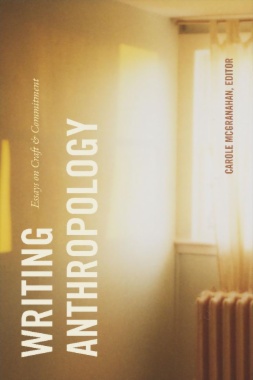In Writing Anthropology, fifty-two anthropologists reflect on scholarly writing as both craft and commitment. These short essays cover a wide range of territory, from ethnography, genre, and the politics of writing to affect, storytelling, authorship, and scholarly responsibility. Anthropological writing is more than just communicating findings: anthropologists write to tell stories that matter, to be accountable to the communities in which they do their research, and to share new insights about the world in ways that might change it for the better. The contributors offer insights into the beauty and the function of language and the joys and pains of writing while giving encouragement to stay at it—to keep writing as the most important way to not only improve one’s writing but to also honor the stories and lessons learned through research. Throughout, they share new thoughts, prompts, and agitations for writing that will stimulate conversations that cut across the humanities.
Contributors. Whitney Battle-Baptiste, Jane Eva Baxter, Ruth Behar, Adia Benton, Lauren Berlant, Robin M. Bernstein, Sarah Besky, Catherine Besteman, Yarimar Bonilla, Kevin Carrico, C. Anne Claus, Sienna R. Craig, Zoë Crossland, Lara Deeb, K. Drybread, Jessica Marie Falcone, Kim Fortun, Kristen R. Ghodsee, Daniel M. Goldstein, Donna M. Goldstein, Sara L. Gonzalez, Ghassan Hage, Carla Jones, Ieva Jusionyte, Alan Kaiser, Barak Kalir, Michael Lambek, Carole McGranahan, Stuart McLean, Lisa Sang Mi Min, Mary Murrell, Kirin Narayan, Chelsi West Ohueri, Anand Pandian, Uzma Z. Rizvi, Noel B. Salazar, Bhrigupati Singh, Matt Sponheimer, Kathleen Stewart, Ann Laura Stoler, Paul Stoller, Nomi Stone, Paul Tapsell, Katerina Teaiwa, Marnie Jane Thomson, Gina Athena Ulysse, Roxanne Varzi, Sita Venkateswar, Maria D. Vesperi, Sasha Su-Ling Welland, Bianca C. Williams, Jessica Winegar
- Cover
- Contents
- Acknowledgments
- Introduction. On Writing and Writing Well: Ethics, Practice, Story | Carole McGranahan
- SECTION I: RUMINATIONS
- 1. Writing in and from the Field | Ieva Jusionyte
- 2. List as Form: Literary, Ethnographic, Long, Short, Heavy, Light | Sasha Su-Ling Welland
- 3. Finding Your Way | Paul Stoller�����������������������������������������
- 4. The Ecology of What We Write | Anand Pandian
- 5. When Do Words Count? | Kirin Narayan����������������������������������������������
- SECTION II: WRITING IDEAS
- 6. Read More, Write Less | Ruth Behar
- 7. Pro Tips for Academic Writing | C. Anne Claus�������������������������������������������������������
- 8. My Ten Steps for Writing a Book | Kristen R. Ghodsee��������������������������������������������������������������
- 9. Slow Reading | Michael Lambek���������������������������������������
- 10. Digging with the Pen: Writing Archaeology | Zoë Crossland��������������������������������������������������������������������
- SECTION III: TELLING STORIES
- 11. Anthropology as Theoretical Storytelling | Carole McGranahan
- 12. Beyond Thin Description: Biography, Theory, Ethnographic Writing | Donna M. Goldstein
- 13. Can’t Get There from Here? Writing Place and Moving Narratives | Sarah Besky
- 14. Ethnographic Writing with Kirin Narayan: An Interview | Carole McGranahan
- 15. On Unreliable Narrators | Sienna R. Craig����������������������������������������������������
- SECTION IV: ON RESPONSIBILITY
- 16. In Dialogue: Ethnographic Writing and Listening | Marnie Jane Thomson
- 17. Writing with Community | Sara L. Gonzalez����������������������������������������������������
- 18. To Fieldwork, to Write | Kim Fortun����������������������������������������������
- 19. Quick, Quick, Slow: Ethnography in the Digital Age | Yarimar Bonilla
- 20. That Generative Space between Ethnography and Journalism | Maria D. Vesperi
- SECTION V: THE URGENCY OF NOW
- 21. Writing about Violence | K. Drybread
- 22. Writing about Bad, Sad, Hard Things | Carole McGranahan
- 23. Writing to Live: On Finding Strength While Watching Ferguson | Whitney Battle-Baptiste
- 24. Finding My Muse While Mourning | Chelsi West Ohueri
- 25. Mourning, Survival, and Time: Writing Through Crisis | Adia Benton
- SECTION VI: WRITING WITH, WRITING AGAINST
- 26. A Case for Agitation: On Affect and Writing | Carla Jones
- 27. Antiracist Writing | Ghassan Hage��������������������������������������������
- 28. Writing with Love and Hate | Bhrigupati Singh��������������������������������������������������������
- 29. Peer Review: What Doesn’t Kill You Makes You Stronger | Alan Kaiser
- 30. When They Don’t Like What We Write: Criticism of Anthropology as a Diagnostic of Power | Lara Deeb and Jessica Winegar
- SECTION VII: ACADEMIC AUTHORS
- 31. Writing Archaeology “Alone,” or a Eulogy for a Codirector | Jane Eva Baxter
- 32. Collaboration: From Different Throats Intone One Language? | Matt Sponheimer
- 33. What Is an (Academic) Author? | Mary Murrell�������������������������������������������������������
- 34. The Writing behind the Written | Noel B. Salazar
- 35. It’s All “Real” Writing | Daniel M. Goldstein��������������������������������������������������������
- 36. Dr. Funding or: How I Learned to Stop Worrying and Love Grant Writing | Robin M. Bernstein
- SECTION VIII: ETHNOGRAPHIC GENRES
- 37. Poetry and Anthropology | Nomi Stone
- 38. “SEA” Stories: Anthropologies and Poetries beyond the Human | Stuart McLean
- 39. Dilations | Kathleen Stewart and Lauren Berlant����������������������������������������������������������
- 40. Genre Bending, or the Love of Ethnographic Fiction | Jessica Marie Falcone
- 41. Ethnographic Fiction: The Space Between | Roxanne Varzi������������������������������������������������������������������
- 42. From Real Life to the Magic of Fiction | Ruth Behar��������������������������������������������������������������
- SECTION IX: BECOMING AND BELONGING
- 43. On Writing from Elsewhere | Uzma Z. Rizvi
- 44. Writing to Become . . . | Sita Venkateswar�����������������������������������������������������
- 45. Unscholarly Confessions on Reading | Katerina Teaiwa���������������������������������������������������������������
- 46. Guard Your Heart and Your Purpose: Faithfully Writing Anthropology | Bianca C. Williams
- 47. Writing Anthropology and Such, or “Once More, with Feeling” | Gina Athena Ulysse
- 48. The Anthropology of Being (Me) | Paul Tapsell��������������������������������������������������������
- SECTION X: WRITING AND KNOWING
- 49. Writing as Cognition | Barak Kalir
- 50. Thinking Through the Untranslatable | Kevin Carrico��������������������������������������������������������������
- 51. Freeze-Dried Memory Crumbs: Field Notes from North Korea | Lisa Sang-Mi Min
- 52. Writing the Disquiets of a Colonial Field | Ann Laura Stoler�����������������������������������������������������������������������
- 53. On Ethnographic Unknowability | Catherine Besteman�������������������������������������������������������������
- Bibliography�������������������
- Contributors�������������������
- Index������������

